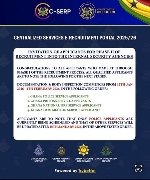MPs feel anti-corruption laws’ll haunt them thus delay in passage – Short
 Emile Short
Emile Short
A former Commissioner on Human Rights and Administrative Justice, Mr Francis Emile Short, has observed that legislators feel their own anti-corruption laws could haunt them, hence their non-commitment in passing such legislation.
Highlighting the importance of political will in tackling corruption, Mr Short cited an example where political expediency caused a near-two-decade delay in the passage of the Right to Information (RTI) Bill.
In his opinion, legislators and other political stakeholders fear they will be caught by their own laws, thus, the lack of commitment to passing them.
He told Kwabena Bobie Ansah on Accra100.5FM’s ‘The Citizen’ show in a one-on-one interview that: “It is because parliament is aware of the important role that such a legislation will play in the fight against corruption [in the case of the RTI Bill] and I believe that Members of Parliament, sometimes, see themselves as possible victims of such [anti-corruption] legislation”.
The former judge stated that: “Corruption [is] not a perception, it is a reality”, adding that: “I would say that in Ghana, and in most parts of Africa, corruption is a norm, it is accepted as a norm, as the way of life” contrary to what is witnessed in developed countries.
Mr Short expressed concern that “in our society, if you are not corrupt, you are considered to be the exception and I think we have to move from that position”.
He called for effective collaboration between the legislature, judiciary, and the executive to deal with the canker due to the billions of cedis the country loses as a result, which, in turn, stifles economic development, infrastructure expansion, provision of health facilities and many other interventions.
For him, there is a “lack of enforcement of laws and regulations”, a situation he believes calls for greater awareness about the repercussions of corruption to the economy and the deprivation of facilities and services to the public.
Mr Short subsequently proposed stiffer sanctions for culpable individuals to serve as an effective deterrent.
“There is a need for greater sanctions to be imposed on those who indulge in corruption. There is a need for greater effectiveness of the anti-corruption agencies. There is a need for anti-corruption legislation, which I don’t think parliament has addressed sufficiently,” he observed.
He said the country’s political system encourages corruption and abuse of office. “The way we practice our politics fuels corruption”.
To buttress his point, he noted that: “It should not require too much money for anybody who wants to be elected into political office but what we see today is monetisation of politics”.
This, he said, compels elected officials to use corrupt means to recoup their expenditure.
Watch the full interview below:
Source: David Apinga
Trending News

66-year-old man found dead in suspected suicide at Nudu Akwamu
10:05
C-SERP announces phase II of 2025/26 Security Services Recruitment
12:07
Police restore calm after youth clashes at Mankessim Shell Fuel Station
09:32
Suspicious aircraft lands in Paga sparking security concerns
19:41
Former PMMC boss advises GoldBod against repeat of past trading losses
09:51
C-SERP announces screening dates and documentation requirements for 2025/2026 Security Services Recruitment
11:46
C/R: Cape Coast Assembly moves to restore Victoria Park
09:53
Concerned Youth of Tema reject claims of unauthorised demolition by TDC
16:49
Upper East Airport project advances as aviation chiefs laud “Alagumbe” local group’s pivotal role
09:48
AMA boss appeals to NPP to boycott Ayawaso East by-election
11:37



